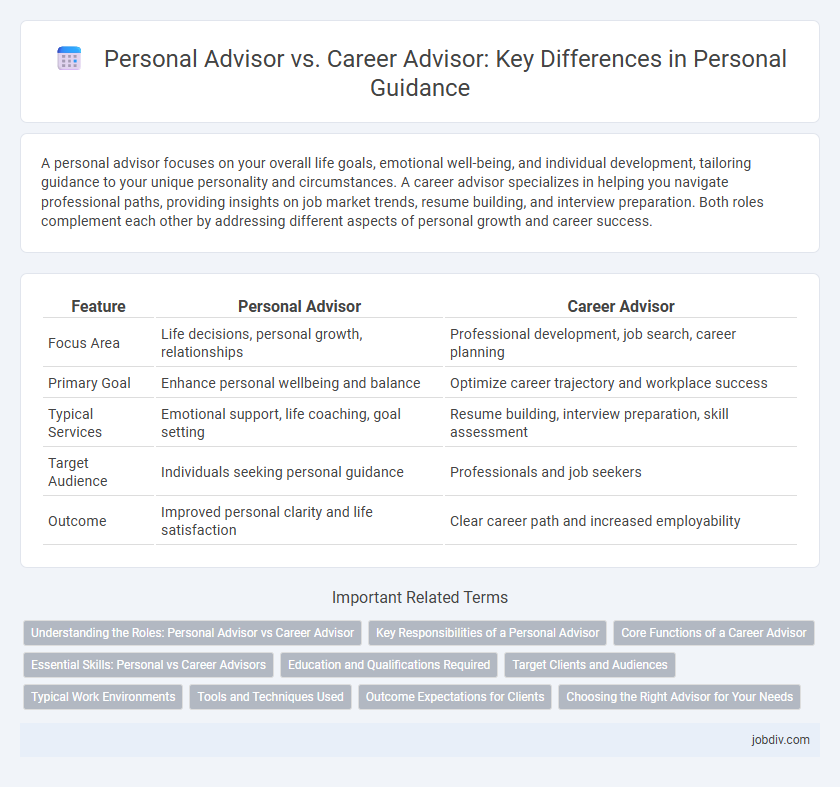A personal advisor focuses on your overall life goals, emotional well-being, and individual development, tailoring guidance to your unique personality and circumstances. A career advisor specializes in helping you navigate professional paths, providing insights on job market trends, resume building, and interview preparation. Both roles complement each other by addressing different aspects of personal growth and career success.
Table of Comparison
| Feature | Personal Advisor | Career Advisor |
|---|---|---|
| Focus Area | Life decisions, personal growth, relationships | Professional development, job search, career planning |
| Primary Goal | Enhance personal wellbeing and balance | Optimize career trajectory and workplace success |
| Typical Services | Emotional support, life coaching, goal setting | Resume building, interview preparation, skill assessment |
| Target Audience | Individuals seeking personal guidance | Professionals and job seekers |
| Outcome | Improved personal clarity and life satisfaction | Clear career path and increased employability |
Understanding the Roles: Personal Advisor vs Career Advisor
A Personal Advisor provides guidance on life decisions, emotional well-being, and personal development, focusing on holistic support tailored to individual circumstances. A Career Advisor specializes in professional growth, offering advice on job search strategies, resume building, and career planning aligned with market trends. Understanding these distinct roles helps individuals seek targeted expertise to optimize both personal fulfillment and career success.
Key Responsibilities of a Personal Advisor
A Personal Advisor provides tailored guidance on life decisions, financial planning, mental wellness, and relationship management, aiming to enhance overall personal development. They assess individual goals and challenges to create customized strategies that promote growth and well-being in various aspects of life. Unlike Career Advisors, their focus extends beyond professional path planning to include holistic personal support and life balance optimization.
Core Functions of a Career Advisor
Career advisors specialize in guiding individuals through career choices by assessing skills, interests, and market trends to recommend suitable job opportunities and educational paths. Their core functions include resume building, interview preparation, and facilitating networking opportunities to enhance career advancement. Unlike personal advisors who focus broadly on life decisions, career advisors specifically target professional development and employment strategies.
Essential Skills: Personal vs Career Advisors
Personal advisors excel in emotional intelligence, active listening, and empathy to support clients' life decisions and personal growth effectively. Career advisors focus on analytical skills, labor market knowledge, and goal-setting techniques to guide clients in professional development and job placement strategies. Both roles require strong communication and problem-solving abilities tailored to their distinct client needs.
Education and Qualifications Required
A Personal Advisor typically requires qualifications in psychology, counseling, or social work, emphasizing skills in emotional support and life coaching. A Career Advisor often holds a background in career development, human resources, or education, with certifications like Certified Career Counselor (CCC) or career coaching credentials. Both roles benefit from formal education and specialized training, but Career Advisors focus more on employment trends and skill assessment while Personal Advisors address broader personal development needs.
Target Clients and Audiences
Personal advisors primarily serve individuals seeking guidance on life decisions, emotional challenges, and personal growth, often catering to a broad audience including students, professionals, and retirees. Career advisors focus specifically on clients aiming to develop their professional paths, such as job seekers, career changers, and recent graduates, emphasizing skills assessment, resume building, and job market navigation. Both advisors tailor their services to distinct needs, ensuring targeted support based on the client's unique personal or career goals.
Typical Work Environments
Personal advisors typically operate in more informal settings such as community centers, private offices, or client homes, fostering a comfortable environment for discussing life goals and personal challenges. Career advisors often work within educational institutions, corporate offices, or employment agencies, providing structured guidance on job searches, career development, and skill assessments. Both roles require confidentiality and a supportive atmosphere but differ significantly in their work environments tailored to personal growth versus professional advancement.
Tools and Techniques Used
Personal advisors utilize tools such as personality assessments, mindfulness techniques, and goal-setting frameworks to enhance individual well-being and life satisfaction. Career advisors employ aptitude tests, labor market analysis, and resume-building software to guide clients toward suitable professional paths. Both rely on digital platforms to facilitate personalized counseling and track progress efficiently.
Outcome Expectations for Clients
Personal advisors tailor guidance to individual life goals, improving overall well-being and decision-making confidence, resulting in enhanced life satisfaction. Career advisors specialize in professional development, focusing on skill-building, job placement, and career trajectory optimization, which leads to increased employment opportunities and long-term career success. Clients working with personal advisors often experience holistic growth, while those consulting career advisors achieve targeted advancements in their professional paths.
Choosing the Right Advisor for Your Needs
Choosing the right advisor depends on your specific goals: a personal advisor helps navigate life decisions, relationships, and emotional challenges, while a career advisor focuses on professional development, job search strategies, and skill enhancement. Understanding whether you need support with personal growth or career advancement is essential to select the appropriate advisor, ensuring tailored guidance and actionable advice. Prioritize credentials and experience relevant to your unique situation for effective and meaningful results.
Personal Advisor vs Career Advisor Infographic

 jobdiv.com
jobdiv.com